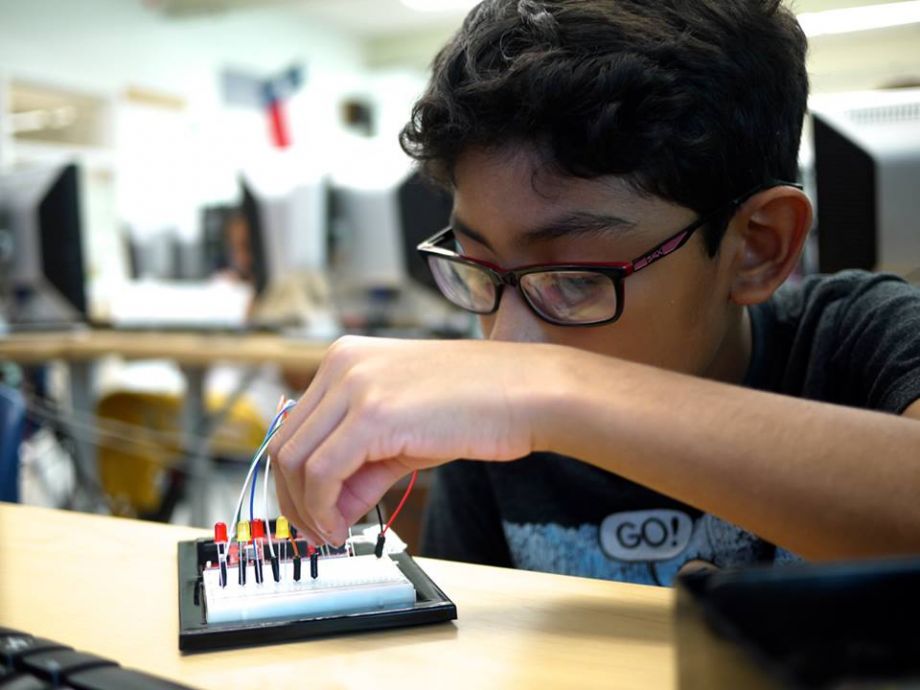“We want families to talk about STEM,” says Amanda Longtain, director of programs at Austin’s Skillpoint Alliance. “We want people to know that it’s all around them. I feel like there’s a lack of understanding when it comes to the acronym. A lot of people feel like it’s difficult, but it’s the toothbrush; it’s the cereal box; it’s the chair you sit in.”
Skillpoint Alliance was founded 20 years ago in response to a shortage of skilled local workers during the construction of Austin-Bergstrom International Airport. The organization aims to close the economic segregation gap in Austin — one of the highest in the country.
Its core program, Gateway, provides rapid training and education for entry-level employment in fields such as construction, HVAC, electrical and machine operating. In recent years, they’ve expanded to include more project-based STEM educational programming for youth as well as adults.
“It just seemed obvious to us that we needed to combine our adult computer proficiency series and our STEM innovation camps,” says Longtain. Last week, the organization launched its first multigenerational summer series with the aim to foster family conversations about STEM careers. In each free three-week series, parents and/or grandparents will receive daily instruction on basic computer skills, while their children and teenagers (from ages three to 14) participate in hands-on projects intended to encourage STEM career paths.
Two challenges to graduation rates of Skillpoint Alliance’s adult programs have been dropouts and participants lacking childcare. This series is able to address both barriers simultaneously. Concurrent instruction also has the added value of bringing conversations about tech and “making” into the home, so that when youth are choosing between middle schools or high schools, families can make guided decisions about STEM or trade pathways.
In the computer proficiency course, adults learn how to email, build their resumes, use spreadsheets for personal financing, become handy with mobile technology and practice their interviewing skills. In one of the video game design camps for the youth, children are designing their own games and finding out how circuitry and electronics work. Another camp is focused on a maker curriculum where kids learn how to use power tools safely, become familiar with the engineering design process and graduate having built a full prototype.

(Credit: Skillpoint Alliance)
In this first pilot year, Skillpoint Alliance has targeted the Johnston Terrace neighborhood in the East Austin corridor, as well as adjacent suburbs, targeting outreach at community events and through community organizations. “Affordability in Austin is becoming quite difficult. It’s pushing a lot of our families to the outskirts of the city,” says Longtain. “The suburbs are changing very rapidly, so we like to go in and transition and train the workforce.”
The city of Austin serves free and low-cost lunch throughout the summer at East Side Memorial High School, where the program is located this year — a strategic venue choice. After receiving morning instruction, Longtain says, “the moms, dads, grandmoms or grandpas go to the classrooms, get their kids and then they walk to the cafeteria together and share lunch. It’s been really beautiful.”
She adds that she knows at least one family where a grandmother is taking the adult computer proficiency course with her daughter while her grandchildren attend the STEM innovation camps.
“We as an organization realized that you can’t just lift one person out of poverty,” she says. “We will be much more successful if we can give entire families what they need to lift themselves out of poverty.”
The Equity Factor is made possible with the support of the Surdna Foundation.

Alexis Stephens was Next City’s 2014-2015 equitable cities fellow. She’s written about housing, pop culture, global music subcultures, and more for publications like Shelterforce, Rolling Stone, SPIN, and MTV Iggy. She has a B.A. in urban studies from Barnard College and an M.S. in historic preservation from the University of Pennsylvania.

















